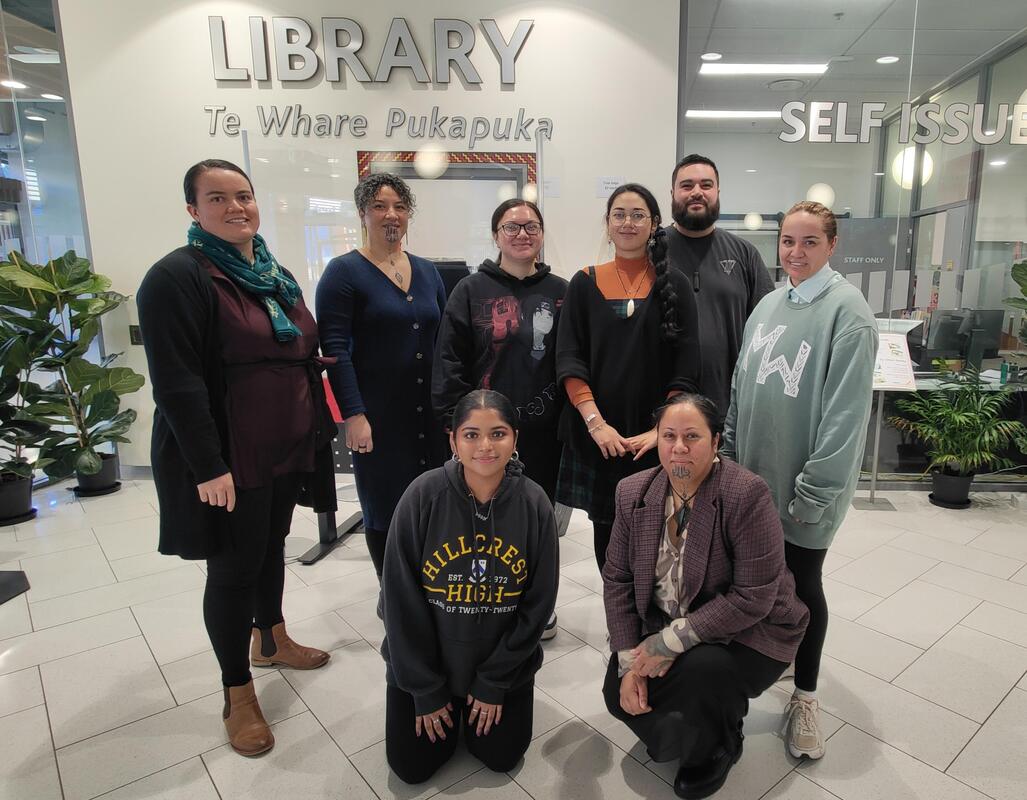It was clear that indigenous expertise was required to lead this work. After reorganising the library in 2022, six new dedicated Māori and Pacific positions and two Māori and Pacific student assistant roles were created. It was necessary to attract the right people to these roles, so they were advertised with as much flexibility as possible, and cluster recruitment ensured the staff filling these positions were not coming in alone.
The Pou Ārahi (Cultural Advisor) role is held by Dr Rangihurihia McDonald (Ngāti Maniapoto), who is responsible for relationships with Māori communities and supporting the achievement of Māori student and staff equity. She also leads the library’s anti-racism work.
Hollie Tawhiao (Ngāti Tiipa) is the Kaitiaki Mātangireia and oversees the Mātangireia collection of Māori, Pacific and indigenous resources. Hollie ensures appropriate manaaki of the collection in collaboration with our communities.
Ngāwaiata Henderson (Ngāpuhi, Maniapoto, Tūhoe, Ngāti Hāua) has taken up the post of Te Mata Aurei as part of the Teaching and Learning team. The team is responsible for teaching library skills to students and researchers, and Ngāwaiata’s role focuses on tauira Māori.
Ammon Apiata (Ngāpuhi, Ngāti Toarangatira, Ngāti Koata) has taken on the role of the Māori and Indigenous Research Support Advisor in the recently formed Open Research team. The team is tasked with advancing the university’s open research culture and supporting researchers to make their work open and accessible. In addition, Ammon’s role includes implementing and advising on Māori data sovereignty concerning the storage and management of research data.
Kalehi Apete (Fakaofo, Tokelau) is our Kauvaiora. She guides Pacific-identifying researchers about indigenous data sovereignty, research data management, publishing pathways to reach indigenous audiences and open-access equity funding. The Kauvaiora role is the first-ever library role that is solely committed to fulfilling the goals of the university's Pacific Strategic Plan. This has involved building the foundation for engaging with our Pacific communities and reforming the Pacific collection.
Keshia Cleverly Karaitiana (Waikato-Tainui, Te Rarawa, Ngāti Kahungunu ki Wairarapa, Kāi Tahu) is the Kaitūhono (Māori Engagement Advisor). This role engages our Māori communities, promotes library services and runs events.
Ngaki Te Kare-Ruaine (Ngāti Wairere and Ngāti Maniapoto) is our Māori student assistant, a new position created to support rangatahi Māori into library pathways. Ngaki works closely with the Mātangireia team.
A further role was created for a Pacific student assistant, and Neha Nisha has taken up this post. Neha works closely with the Mātangireia team and our Kauvaiora to expand the Mātangireia Pacific collection.
The addition of these positions has resulted in Māori and Pacific staff numbers increasing from approximately 7% to 21% overall. The manager group is now 33% Māori, and the library is beginning to reflect our user communities more accurately.
Attention has turned to ensuring the lived experiences of our kaimahi are positive. In January 2023, the Kaimahi Forum was established to provide an exclusive space for Māori and Pacific staff to come together, collaborate and share ideas, and advise library management on Māori and Pacific matters. Our kaimahi work collaboratively to deliver initiatives that contribute to our library plan. Te reo Māori-speaking staff have begun facilitating regular te reo practice sessions within team meetings, creating reference and research resources in te reo, and holding waiata practices for all library staff.
We have started our anti-racism work involving team conversations about casual racism/racial micro-aggressions in the workplace. We have also developed a reporting form for library staff to report this. Library management takes these reports seriously and works together with those affected to resolve the issues that arise. All library staff are supported to take responsibility for their learning in the anti-racism space, so an anti-racism resource list has been curated. Everyone must have at least one anti-racism goal on their annual development plan.
All library staff must attend a training session on Te Tiriti o Waitangi and te ao Māori, including a local iwi context component. Our kaimahi further support this learning with training and support that is relevant to us in the library. For example, kaimahi have recently delivered a presentation on indigenous research as part of a series aimed at supporting staff who work with indigenous researchers and the materials of interest to these communities.
Māori, Pacific and other indigenous researchers are being supported in the open research space to make informed decisions about where they place their work and understand its reach and impact. The library recently established an Open Access Equity Fund, which prioritises Māori and Pacific researchers, among others, to publish open access and make their research publicly available.
Kaimahi have also improved relationships with Māori and Pacific communities across campus and beyond. We have hosted open-house events, promoted our services and offered tours of our spaces, archives and collections of interest to Māori and indigenous communities. We have worked collaboratively with the Waikato Students’ Union, other student groups and staff on campus to host activities to celebrate significant events throughout the year, such as Matariki, Te Wiki o te Reo Māori and Pacific language weeks. We have also been working to increase the visibility of Māori and Pacific content in the library’s digital spaces.
While our kaimahi have already achieved a lot, there is much more work to be done. Indigenising our processes, services and collections will not be a quick fix but an ongoing project involving all library staff. Nō reira, hoake tātou!
This article is a collaborative effort of the featured staff.



 RSS Feed
RSS Feed